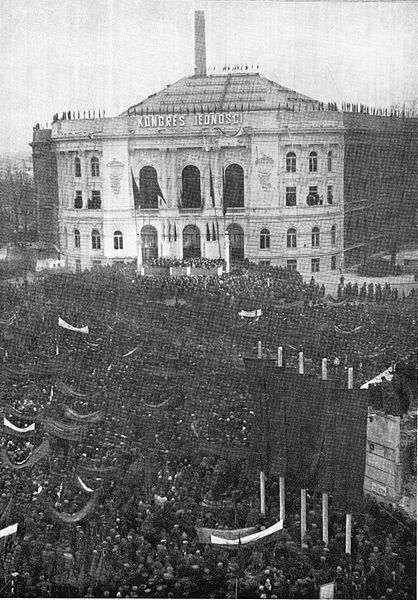1968 Polish political crisis
The Polish 1968 political crisis, also known in Poland as March 1968, Students' March, or March events, was a series of major student, intellectual and other protests against the ruling Polish United Workers' Party of the Polish People's Republic. The crisis led to the suppression of student strikes by security forces in all major academic centres across the country and the subsequent repression of the Polish dissident movement. It was also accompanied by mass emigration following an antisemitic campaign waged by the minister of internal affairs, General Mieczysław Moczar, with the approval of First Secretary Władysław Gomułka of the Polish United Workers' Party (PZPR). The protests overlapped with the events of the Prague Spring in neighboring Czechoslovakia – raising new hopes of democratic reforms among the intelligentsia. The Czechoslovak unrest culminated in the Warsaw Pact invasion of Czechoslovakia on 20 August 1968.

The commemorative plaque at the University of Warsaw for the students demanding freedom of speech in 1968
Władysław Gomułka with Leonid Brezhnev in Berlin on 17 April 1967
The Dziady theatrical event and its cancellation triggered student protests and violent response by the authorities
General Mieczysław Moczar initiated and led the widespread antisemitic campaign of 1968
Polish United Workers' Party
The Polish United Workers' Party, commonly abbreviated to PZPR, was the communist party which ruled the Polish People's Republic as a one-party state from 1948 to 1989. The PZPR had led two other legally permitted subordinate minor parties together as the Front of National Unity and later Patriotic Movement for National Rebirth. Ideologically, it was based on the theories of Marxism-Leninism, with a strong emphasis on left-wing nationalism. The Polish United Workers' Party had total control over public institutions in the country as well as the Polish People's Army, the UB and SB security agencies, the Citizens' Militia (MO) police force and the media.
Statute of the Polish United Workers' Party, 1956 edition
Crowds gathered in front of the main building of Warsaw University of Technology for the Unification Congress of the Polish Workers' Party and Polish Socialist Party (15 to 21 December 1948)
Władysław Gomułka, at the height of his popularity, on 24 October 1956, addressing hundreds of thousands of people in Warsaw, asked for an end to demonstrations and a return to work. "United with the working class and the nation", he concluded, "the Party will lead Poland along a new way of socialism".
First Secretary of PZPR Edward Gierek (left) with Speaker of the House of Representatives Carl Albert (right), Washington D.C., 1974








